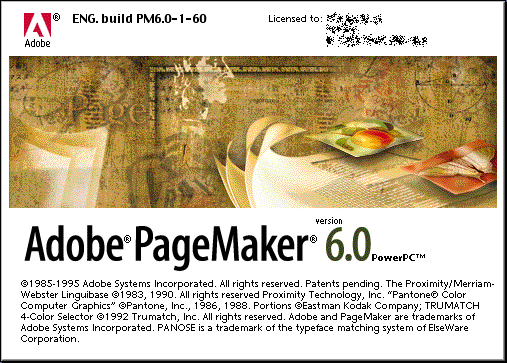
 20 years in IT and still going strong... The first time I used Java was sometime in 1997. Starting in 1996 at my first corporate IT job (thanks always to David Fraser), I was part of the development environment support team at AT&T Wireless (just formerly McCaw Cellular) and we were writing lots of tools to support our gigantic Axys Call Center CRM application (HPUX on the server side with one of the largest Sybase deployments in the US, and Mach OS NeXT workstations on the front end -- cool stuff!).
20 years in IT and still going strong... The first time I used Java was sometime in 1997. Starting in 1996 at my first corporate IT job (thanks always to David Fraser), I was part of the development environment support team at AT&T Wireless (just formerly McCaw Cellular) and we were writing lots of tools to support our gigantic Axys Call Center CRM application (HPUX on the server side with one of the largest Sybase deployments in the US, and Mach OS NeXT workstations on the front end -- cool stuff!).
Lots of bash scripting (to help with test deployments and dataset creation) and C coding and apache/cgi (to manage our test environments). Now here was a language that didn't have pointers and automatic garbage collection? Count me in. C/C++ is fast but the pointers killed me. I was a Liberal Arts major and had some Pascal classes and learned C/C++ in night school. Compared to my CS colleagues I was looking for an easier programming solution. Java slowness didn't matter too much for our work. When we moved our workstations from NeXT to Windows, developing on one OS and deploying to servers without code changes made life easy.
Late 1998 and early 1999 was spent helping teams verify legacy code in Objective C to avoid the dreaded Y2K date bug on our NeXT Call Center apps -- Objective C was future-proof: lots of review, very few changes. I was doing Java on the side (evenings and weekends) and by mid-1999 I was a full time Java developer (apache / tomcat / JDBC) at Oracle. My goal from 1994 to be a programmer was achieved! I continued Java coding at a start-up (fishmonger.com, and later worldcatch.com). It was an awesome time and Seattle felt like the center of the universe. Start-ups were a dime a dozen, general unemployment at less than 5%, (software even less), salaries were sky-high. My work was really interesting, helping to manage the IBM auction platform (AIX, DB2, Webshere, and Lotus Notes). I had attended Java One in San Francisco three times running. Java was and is my hammer for the programming problem.
Y2K was the year in Seattle that the dot-com bubble burst and me and every colleague and friend were hit by the dot-bomb. A death spiral emerged, filled with start-up flotsam and vanquished idea jetsam of what it takes to make it in the dot-com era. The start-ups disappeared. All kinds of business constricted. The software development industry collapsed with bleak prospects for work. Where before recruiters were calling regularly asking you to jump ship it turned into 30 programmers interviewing for a software position. I never regretted more than at that time about leaving the AT&T mothership and striking out for success. Unemployed. My 401K was wiped out. My stocks vanished into the ether as if they never existed. I felt like I was right back where I started, once again affected by an economic cycle beyond my control.
I had moved to Seattle in 1993 right after college as it was one of the few places that had work (any type of work to pay my student loans: delivery driver, filing, gutter cleaner...) as the 1992 recession made it really hard for college graduates, especially those with Liberal Arts degrees like myself, to find work. I was among thousands of economic migrants who came because there wasn't anything else. I can remember being at a temp agency for general office work and the room was asked how many people arrived this week, 50 hands showed, how many last week, 100 hands went up. We were all looking for work. 27 years old and my goal of being a photo journalist, my primary interest in college, was difficult as the recession caused most secondary city newspapers to shutter and there were hundreds of very qualified photographers looking for work. (And in reality, though I enjoyed it, I wasn't a very good photo journalist.) After being completely depressed after a year's reading of the Seattle Sunday Times which had thousands of software jobs filling up 20+ pages of tiny want ads -- and zero jobs for photographers -- I decided that software was my future.
I wasn't completely unfamiliar with programming, having learned BASIC in high school on a TRS-80 and later Pascal (which I loved) at Boston University in the EE program. I risked losing my ROTC scholarship due to poor performance and I had to stop school. Those classes did help me get a job as a night operator that transitioned to a programmer position (Databus language on Datapoint computers) at a small printing company outside Boston, before restarting school at UT Austin. That was 10 years earlier and I hadn't done diddly squat in computers since that time. But I felt I had the aptitude. And the desire. I enrolled in night C, C++ and assembly courses at UW. I bought a bottom-of-the-line Mac with money my parents gave me to get my awful teeth fixed, went to Kinko's, copied all of their software (this was before serial numbers were used and it was easy to transfer software via floppies -- something I would never do now -- when you're poor it is easy to justify victimless crimes), and started to learn the graphics programs. In 1995 I got my first "computer" job as a desktop publisher at $5 an hour. I was stoked as I had a job using a Mac computer. It wasn't programming but one had to start somewhere.  And learning Aldus Pagemaker was my foot-in-the-door for working as a tester ($15 an hour!) a year later on Adobe Pagemaker 6.0, where I was in surrounded by dedicated testers and hard-core C++ programmers. A real eye opener and very motivating. Adobe seemed like an awesome company. I literally gained 10 lbs. from finally having an income and being able to eat at restaurants for the first time. And now eight years later I'm again hit by an economic downturn and this time it's worse as I have a mortgage and car payments. Looking back it seems so obvious that the entire Internet economy was hot air. The problem is that it is impossible to have an objective perspective when you're in the epicenter of an economic bubble. It's hard to see reality, that everything is a house of cards. It wasn't until I got my MBA in 2008 that I realized just how insane the idea of the "dot-com new economy" talk was (financials don't matter; it always about eye balls and page views).
And learning Aldus Pagemaker was my foot-in-the-door for working as a tester ($15 an hour!) a year later on Adobe Pagemaker 6.0, where I was in surrounded by dedicated testers and hard-core C++ programmers. A real eye opener and very motivating. Adobe seemed like an awesome company. I literally gained 10 lbs. from finally having an income and being able to eat at restaurants for the first time. And now eight years later I'm again hit by an economic downturn and this time it's worse as I have a mortgage and car payments. Looking back it seems so obvious that the entire Internet economy was hot air. The problem is that it is impossible to have an objective perspective when you're in the epicenter of an economic bubble. It's hard to see reality, that everything is a house of cards. It wasn't until I got my MBA in 2008 that I realized just how insane the idea of the "dot-com new economy" talk was (financials don't matter; it always about eye balls and page views).
 I was very happy to find more Java work with Saxonia Systems in Dresden, Germany in 2001. Great people. Great company. Moving to another country was truly mind altering and in the end it was just luck that it was Germany. Such an awesome experience. Work-wise we were doing very interesting things, including a client/server project for Agfa's large photo processing hardware. And I even did a bit of J2ME (remember that technology? programming java on cell phones really was a rats' nest compared to today's Android framework). By the time the economic downturn hit Europe from the 9/11 attacks, Saxonia managed to keep me gainfully employed for the five years I worked for them. I only left as I got married and needed to be in Brussels.
I was very happy to find more Java work with Saxonia Systems in Dresden, Germany in 2001. Great people. Great company. Moving to another country was truly mind altering and in the end it was just luck that it was Germany. Such an awesome experience. Work-wise we were doing very interesting things, including a client/server project for Agfa's large photo processing hardware. And I even did a bit of J2ME (remember that technology? programming java on cell phones really was a rats' nest compared to today's Android framework). By the time the economic downturn hit Europe from the 9/11 attacks, Saxonia managed to keep me gainfully employed for the five years I worked for them. I only left as I got married and needed to be in Brussels.
2002 was the last year I was paid to be a Java programmer. Needing to stay employed, and in Europe, meant adjusting to what companies desired while also trying to move up the IT hierarchy chain (salaries have always been much lower in Europe than in the US). I would make a point of keeping my fingers in Java, using my vacation time to focus on projects. I spent a good part of my MBA business plan (in 2008) prototyping a web-based signature signing system in Java. I slowly migrated my accumulated projects to newer JDK versions. From JBuilder to Eclipse. Oracle to MySQL. Not really in the mix of things, Java-wise, and wasn't even sure of the changes between the Java versions (unless my API calls were deprecated).
Flash forward to 2015, following my wife to Japan and suddenly confronted with a job market very different from what I had been planning for. I have lots of time (albeit no money) to focus on something. Great! From afar I was observing so many technology changes that I never had the time to touch. What could I do with Java? Android looks promising. I've had a long interest in artificial intelligence, and robotics. Digging deeper, neural networks is the most promising AI approach. And how can that be done with Java?
The more I've started to get back into Java the more I realized I've got a big learning curve ahead of me. Plus learning an entirely new domain in machine learning. As the Chinese saying goes, "A thousand mile journey begins with a single step." Welcome to my blog where I go down the rabbit hole.
